Top Mobile App Testing Tools for QA Professionals
Mobile application testing ensures the functional and non-functional quality of mobile application workflows. As more users rely on smartphones for daily tasks, expectations for performance and reliability continue to rise.

In 2025, the number of mobile gaming app downloads worldwide is projected to reach 155 billion, rising from an estimated 146 billion in 2024. These numbers highlight the importance of delivering a flawless user experience from the very first interaction.
With a growing number of tools available, choosing the best one that fits your needs can be challenging.
Using mobile app testing tools, manual testing teams can test across platforms and devices. On the other hand, automated tools help write automation scripts, implement parallel execution, and integrate tests in the continuous integration process.
With over 100 available tools on the market, it can be difficult to select one that meets the requirements.
Tools are available for test management and documentation, manual and cross-device compatibility testing, real-device testing, and automation regression testing.
Let’s examine the 10 best mobile application manual and automation tools, distinguished based on their rating, pricing, and key features.
Whether you’re a developer, quality assurance (QA) engineer, or product manager, mobile application testing tools help optimize your app’s performance and deliver a good user experience.
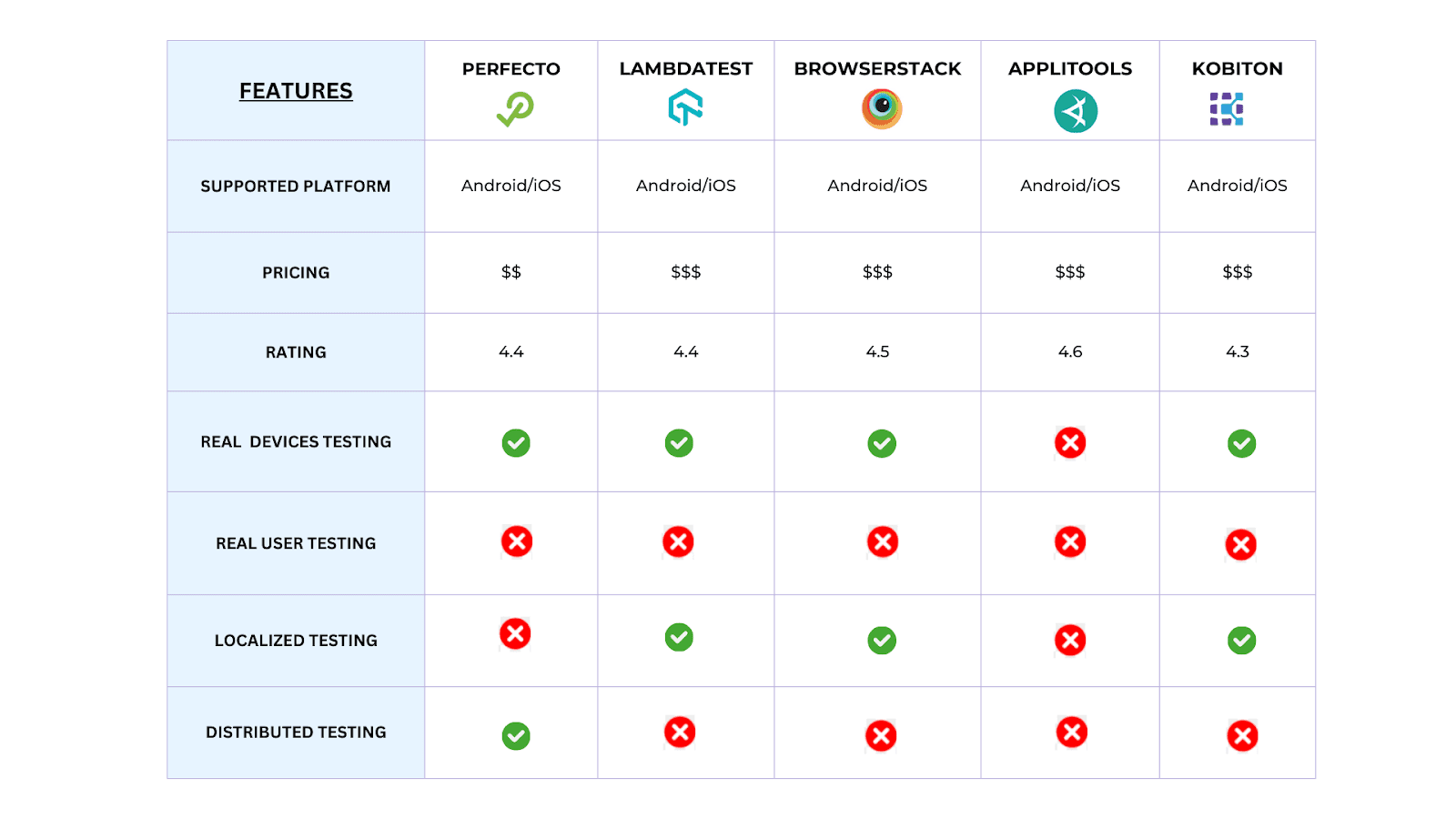
1. TestRail
TestRail is a powerful test case management tool designed to help QA teams organize, track, and manage their software testing efforts.
It provides a centralized platform for creating, maintaining, and executing test cases. It enables and streamlines inter-team collaboration and communication.
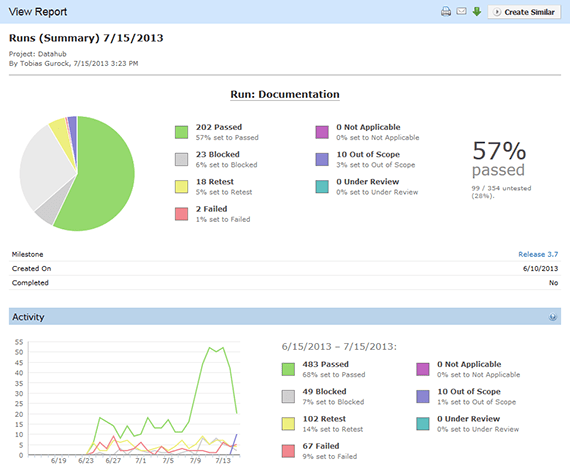
Rating: TestRail has a 4.4 rating according to G2.
Key Features:
Some of the best features include:
- Provide a centralized platform for managing test cases, test plans, and test runs in agile testing.
- Real-time reporting with dashboards showing test progress, coverage, and results.
- Seamless integration with popular tools like JIRA, GitHub, and Selenium.
- Provides customizable fields and workflows to match specific testing needs.
Website: https://testrail.com/
Pricing: TestRail offers a free version for teams, as well as a paid pro version.
2. BrowserStack
BrowserStack is a cloud-based testing platform that provides developers and QA teams with real devices and browsers to test their applications.
It enables automated and manual testing across devices, operating systems, and browsers without setting up physical testing infrastructure.
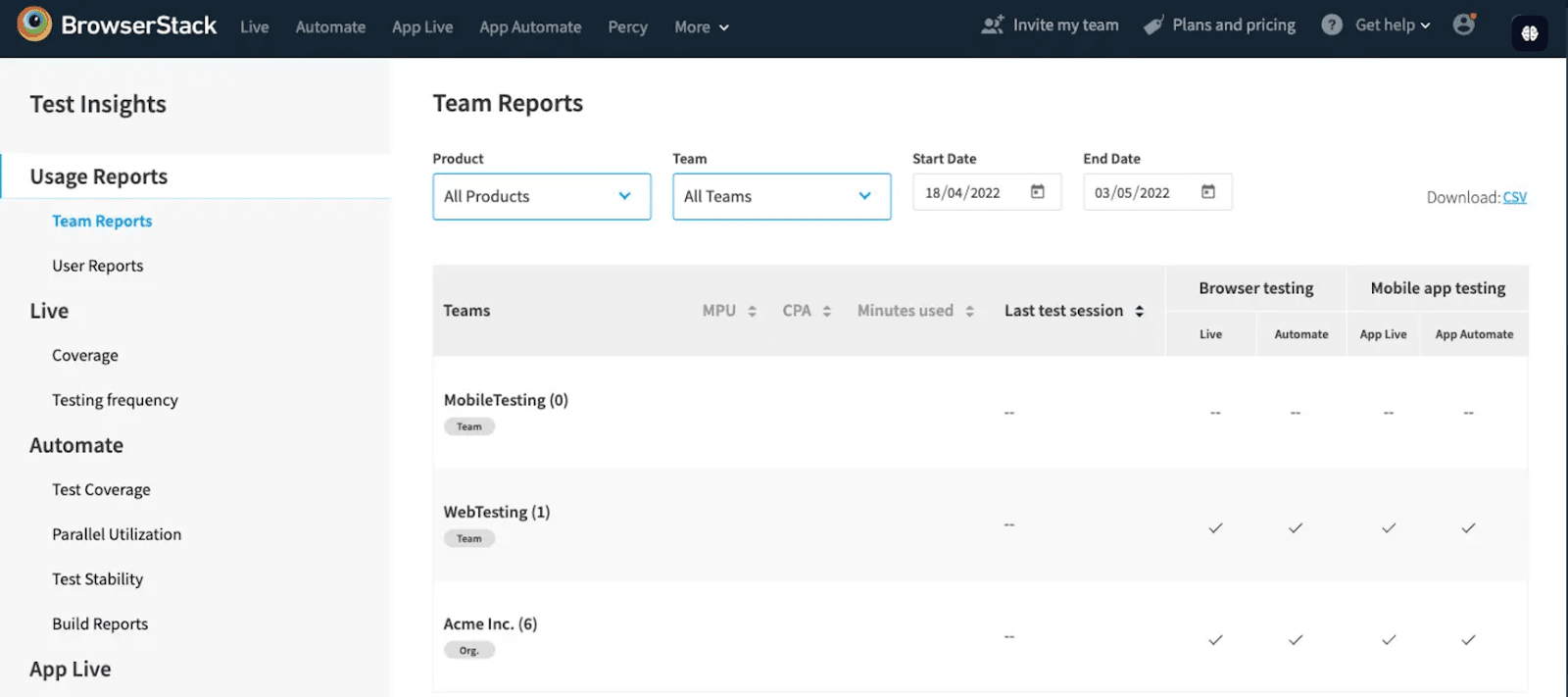
Rating: BrowserStack has a 4.5 rating, according to G2.
Key Features:
The top features of BrowserStack include:
- It does not rely on emulators but uses real Android and iOS devices for accurate testing.
- Provides cross-browser testing for Chrome, Firefox, Safari, and Edge.
- Supports automated testing with frameworks like Selenium, Appium, and Cypress.
- Allows physical and virtual mobile app testing on real devices without setup.
- It supports testing Android and iOS apps, including native and hybrid apps.
Website: https://www.browserstack.com/
Pricing: BrowserStack’s starting price is $39/month. Its pro versions cost as much as $249/month for 5 users.
3. Kobiton
Kobiton is a cloud-based mobile testing platform that allows users to test mobile applications on real devices. Compared to emulators, using real devices ensures an accurate and reliable testing experience.
Kobiton offers real device testing, performance monitoring, and test automation integration with frameworks like Appium and Selenium.
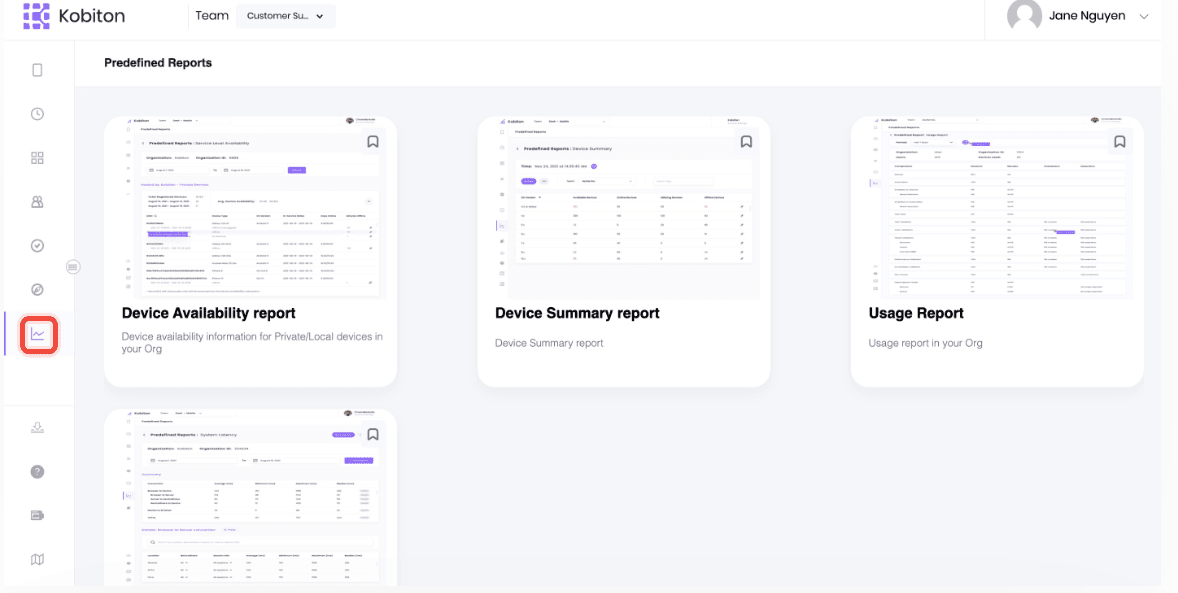
Rating: Kobiton has a 4.3 rating according to G2.
Key Features:
Here are the top features of Kobiton:
- Allows testing on real Android and iOS devices for more accurate results.
- Supports both manual and automated testing with frameworks like Appium and Selenium.
- Provides video recording, screenshots, and detailed logs for easier debugging.
- Enables performance monitoring and testing under various network conditions.
- Integrates with CI/CD tools like Jenkins and GitLab for continuous testing.
Website: https://kobiton.com/
Pricing: The base version of Kobiton costs $83/month, whereas the pro version costs $399/month.
4. LambdaTest
LambdaTest is a cloud-based cross-browser testing platform that allows users to test for web applications across a wide range of browsers, operating systems, and devices.
It enables testing on real browsers and physical devices to ensure that websites perform correctly across different environments.
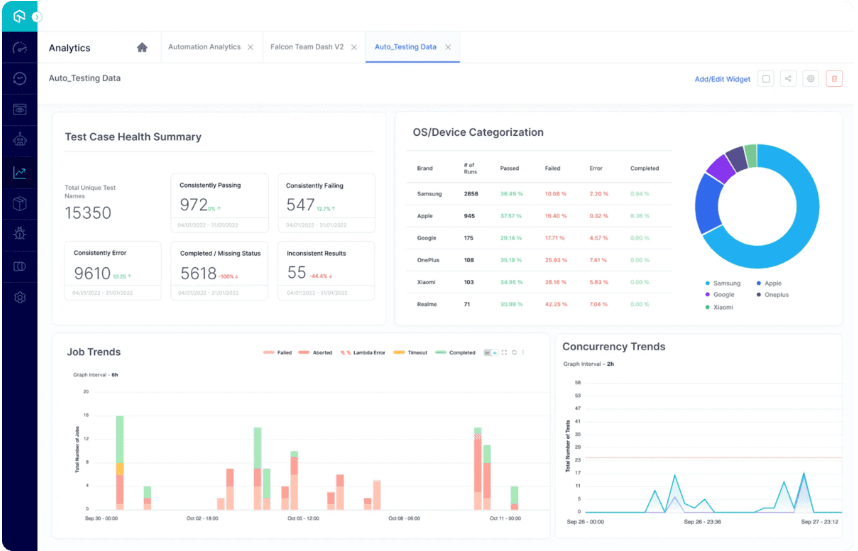
Rating: LambdaTest has a 4.5 rating according to G2.
Key Features:
For testers, here are the top features:
- Test websites on over 2,000 real browsers, devices, and operating systems for compatibility.
- Supports popular testing frameworks like Selenium, Appium, Cypress, and Playwright for automated tests.
- Runs multiple tests simultaneously on different browsers or devices to save time.
- Detect visual differences across web pages to validate the user interface.
- Integrates with CI/CD tools like Jenkins, GitHub Actions, CircleCI, and GitLab for continuous testing.
Website: https://www.lambdatest.com/
Pricing: The price of LambdaTest depends on the number of parallel tests and subscription plans. It costs $400/month for 20 parallel tests on real devices.
5. Applitools
Applitools is a visual testing and monitoring platform that automates user-interface testing in web and mobile applications.
It uses AI to perform visual comparisons of different versions of applications. This helps identify UI discrepancies, such as layout shifts, color changes, and other CSS/HTML issues.
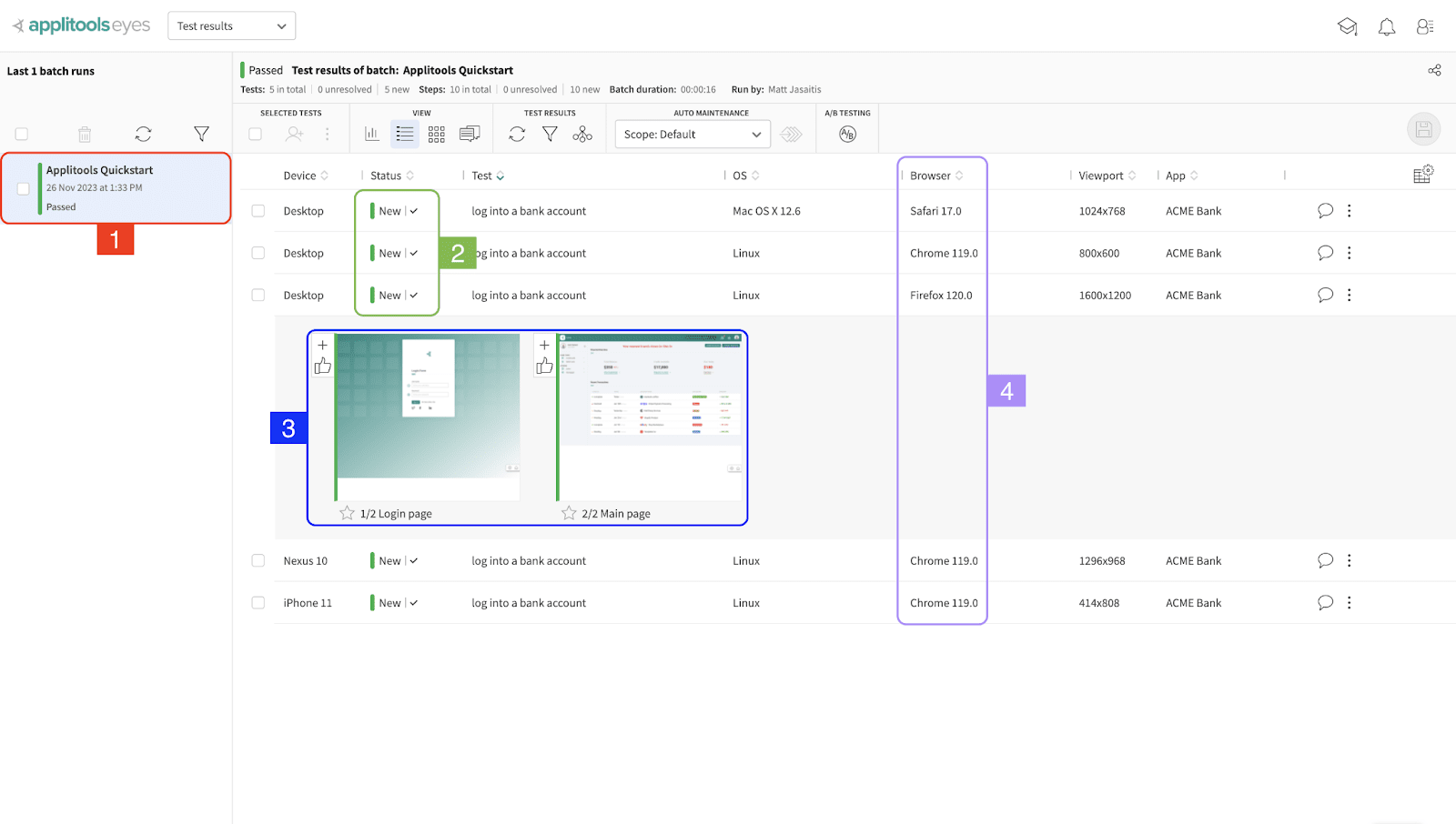
Rating: Applitools has a 4.6 rating, according to Capterra.
Key Features:
Applitools has the following key features:
- Uses AI-powered visual comparison technology to detect UI discrepancies and visual bugs.
- Integrates with popular testing frameworks like Selenium, Appium, Cypress, and Playwright.
- Supports visual regression testing to catch unintended UI changes over time.
- Allows parallel testing across multiple browsers, devices, and screen resolutions.
Website: https://applitools.com/
Pricing: Applitools provides a free version, but most of its features are in the pro version.
6. Perfecto
Perfecto is a cloud-based mobile application testing platform that provides manual and automated testing solutions. It offers real device access, advanced analytics, and integrations with popular testing frameworks.
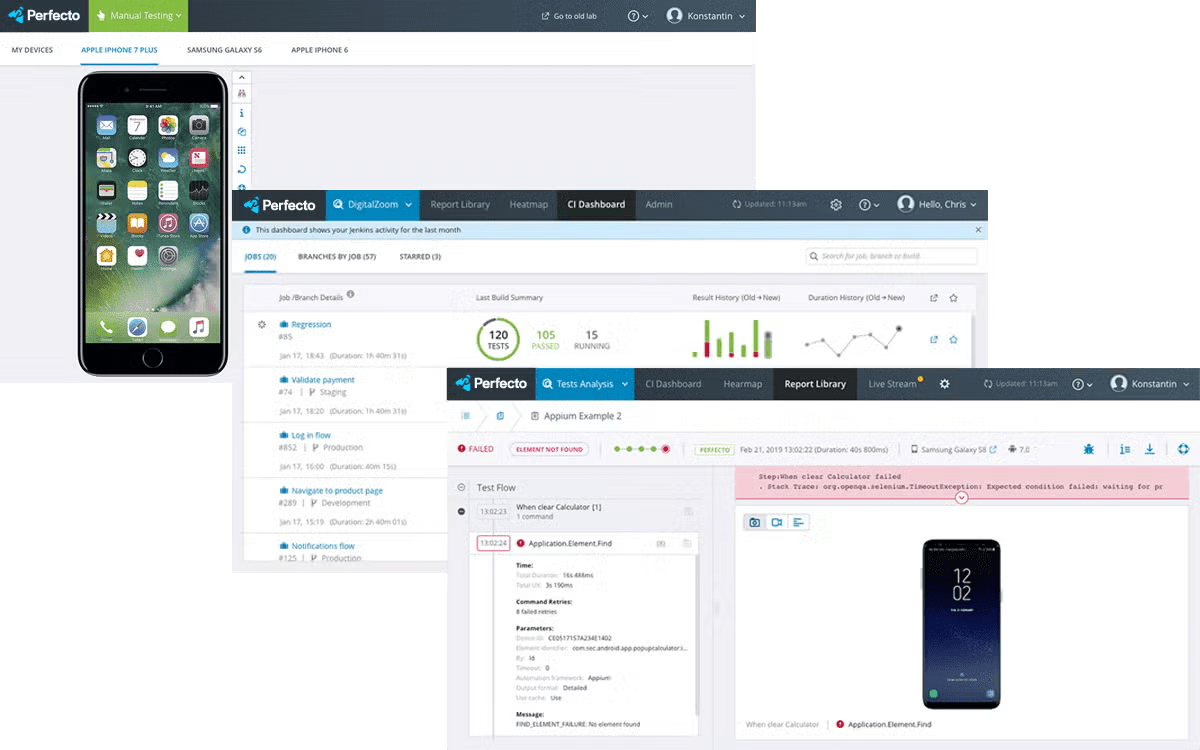
Rating: Perfecto has a 4.4 rating according to G2.
Key Features:
Perfecto has the following key features:
- Provides real device testing on a wide range of Android and iOS devices.
- Supports manual and automated testing with tools like Selenium, Appium, and Cypress.
- Includes advanced analytics with AI-generated insights to identify root causes of failures.
- Enables parallel execution for faster testing cycles.
- Integrates with CI/CD tools like Jenkins, Bamboo, and Azure DevOps.
Website: https://www.perfecto.io/
Pricing: Perfecto offers pricing plans based on the number of devices and testing hours.
Tools for Automated Mobile App Testing
In addition to the manual tools we mentioned above, there are also mobile application test automation tools. They help teams streamline testing processes and reduce test execution time.
These tools test the application compatibility across multiple platforms (iOS and Android) and on multiple device models.
This reduces the cost of buying real devices and ensures that apps meet quality standards across platforms like Android and iOS.
Below, we have suggested four more tools, with a specific focus on automation.
Let’s take a look at the top test automation tools for mobile applications:
7. Appium
Appium is a mobile application testing framework that automates testing for native, hybrid, and mobile web applications.
It has built-in support to execute mobile application tests across Android, iOS, and Windows platforms.
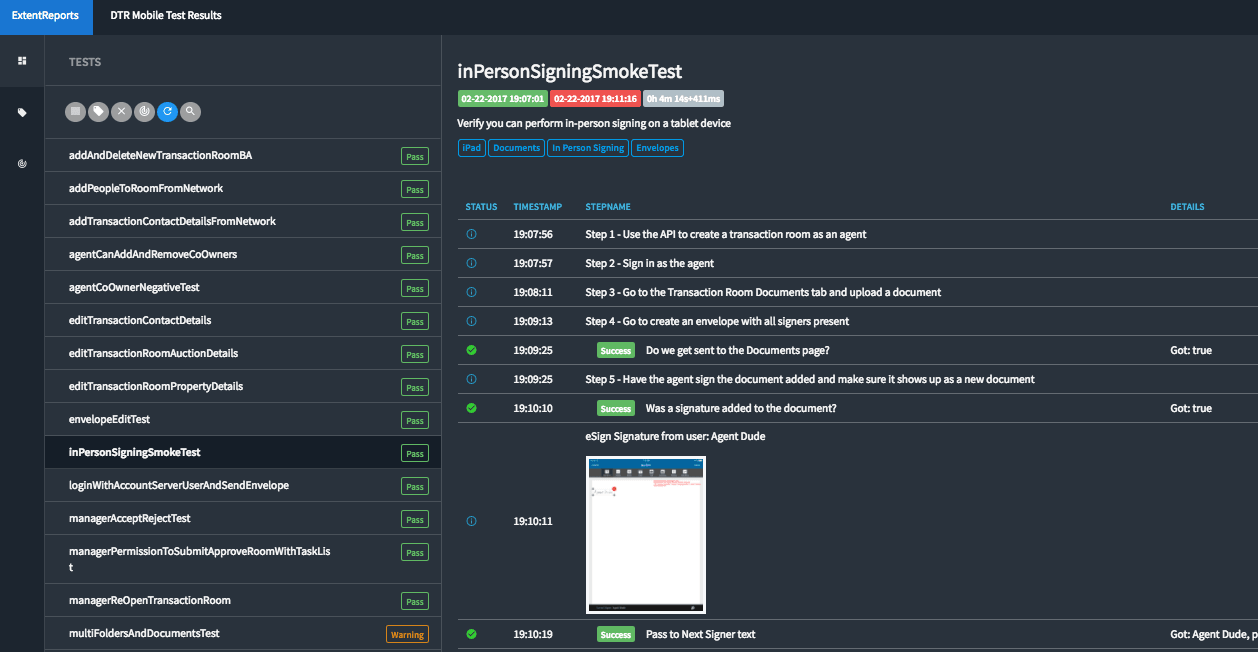
Rating: Appium has a 4.4 rating, according to Gartner.
Key Features:
Some key features of Appium are:
- Cross-platform testing for Android, iOS, and Windows.
- Supports Java, Python, and C#.
- Open-source and free to use.
- Compatible with native frameworks like XC Test and UIAutomator2.
- Built-in UI Inspector for locating UI elements.
Website: https://appium.io/docs/en/latest/
Pricing: Appium is a free and open-source tool.
8. Espresso
Espresso is a mobile UI testing framework designed by Google specifically for Android apps. It helps teams write robust tests by using dynamic waits. This ensures the test scripts automatically wait for UI components to be ready.
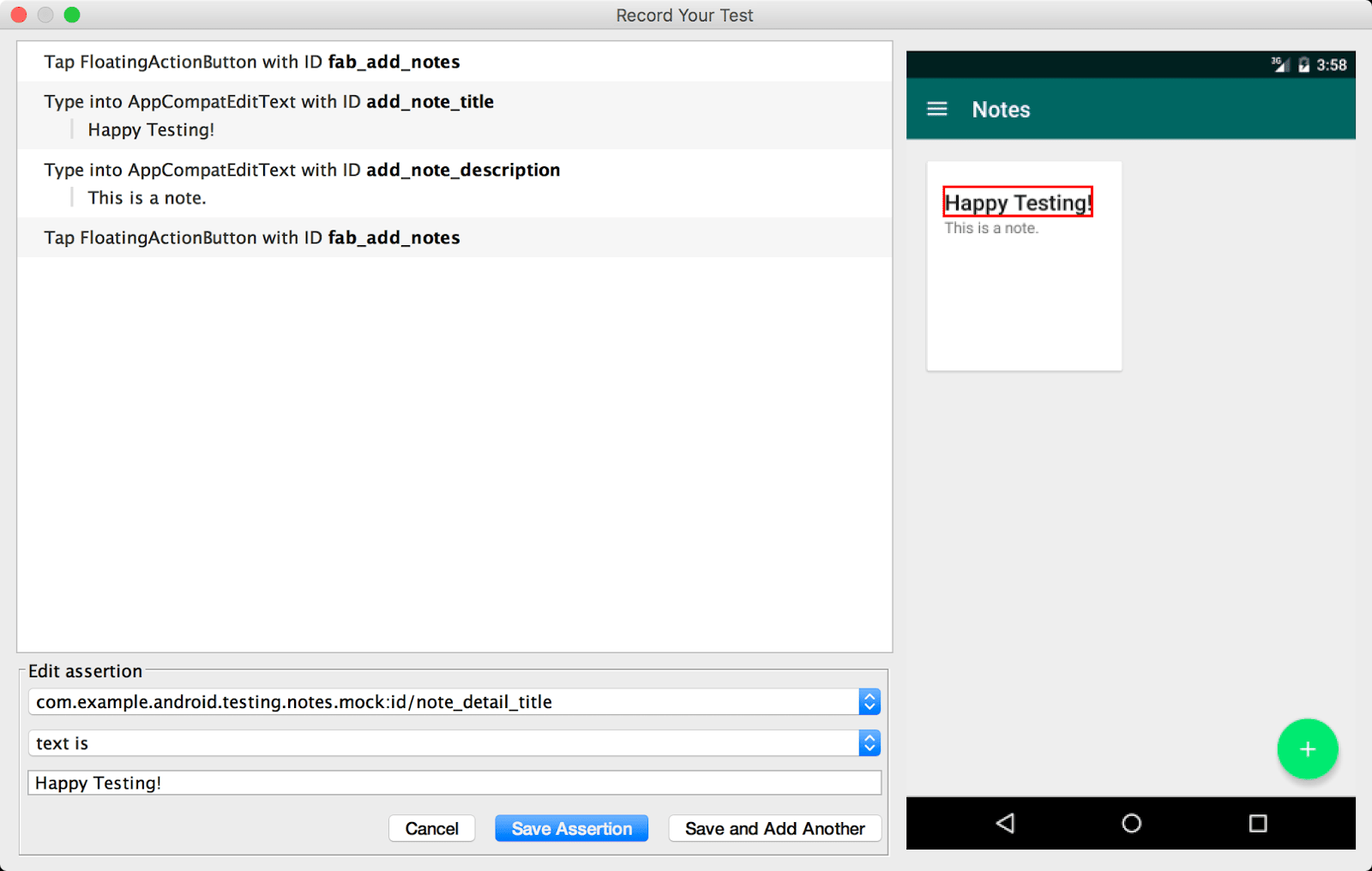
Rating: Espresso has a 3.8 rating according to G2.
Key Features:
The top features of Espresso include:
- Built specifically for Android UI testing with robust and reliable results.
- Synchronizes automatically with app activity and UI components for seamless testing.
- Supports tests written in Java and Kotlin.
- Integrates well with Android Studio for smooth development and testing workflows.
- Allows recording and playback of test scripts for quick test creation.
Website: https://developer.android.com/training/testing/espresso
Pricing: Espresso is a free tool that comes integrated with Android Studio.
9. XC Test
XC test is a free iOS UI testing framework for iOS applications. It provides native support for iOS and supports Apple’s ecosystem to deliver fast, reliable, and accurate tests.
XC test integrates seamlessly with Xcode (Apple’s integrated development environment), enabling teams to test apps within their usual workflows.
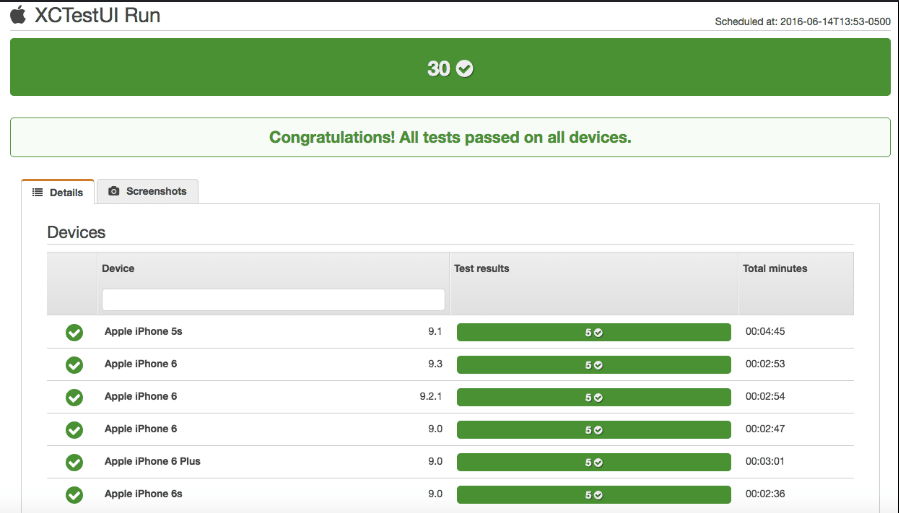
Rating: XC test has a 4.5 rating, according to Capterra.
Key Features:
Here are some of the top features:
- Fully integrated with Xcode, Apple’s IDE, for seamless development and testing workflows.
- Supports testing on both real devices and simulators.
- Works directly with the app’s accessibility tree to interact with UI elements.
- Allows testing of gestures like swipes, taps, and pinches.
- Enables parallel execution of tests across multiple devices.
Website: https://developer.apple.com/documentation/xctest
Pricing: XC test is a free tool that comes with Xcode.
10. TestComplete
TestComplete is an automated testing tool by SmartBear that supports testing for desktop, mobile, and web applications. It provides scripted and scriptless testing options, making it easy for technical and non-technical teams.
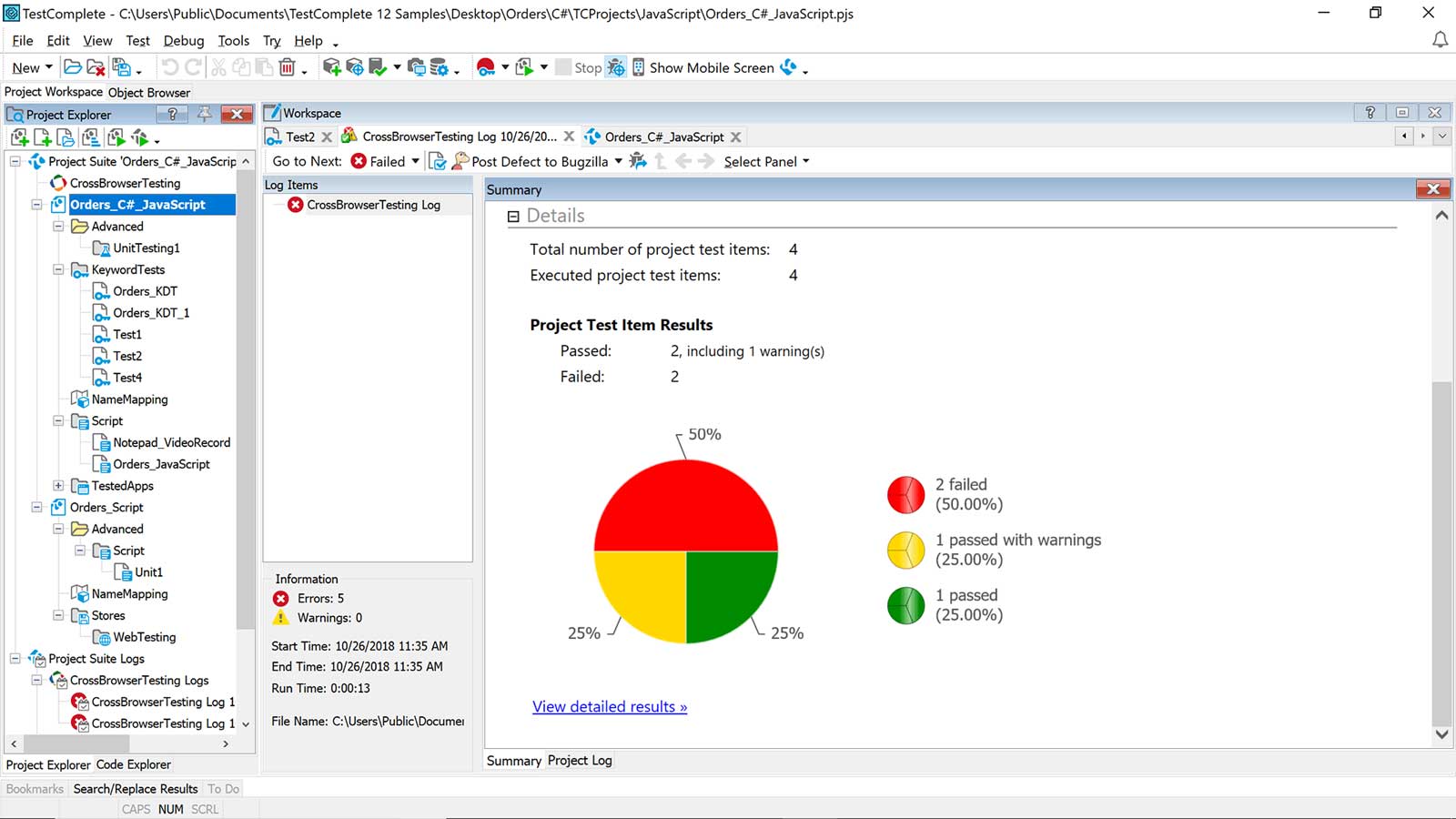
Rating: TestComplete has a 4.2 rating, according to Capterra.
Key Features:
Some key features of TestComplete are:
- Supports automated testing for desktop, mobile, and web applications.
- Offers both scripted (using languages like JavaScript, Python, and VBScript) and scriptless testing options.
- Provides a record and replay feature for easy creation of tests without coding.
- Allows testing on real devices, emulators, and simulators for mobile apps.
- Integrates with popular CI/CD tools like Jenkins, Azure DevOps, and TeamCity.
Website: https://smartbear.com/product/testcomplete
Pricing: The base version of TestComplete starts at €3,908, whereas the pro version costs €5,349 annually.
Choosing the Best Mobile Testing Tool for Your Company
Mobile app testing tools should align with the organization’s development goals, the team’s capabilities and expertise, and project needs.
A compatible testing tool can enhance your testing process, improve productivity, and help deliver better-quality apps faster and more securely.
Here are the key criteria you should evaluate to help you choose the best mobile app testing tool for your organization:
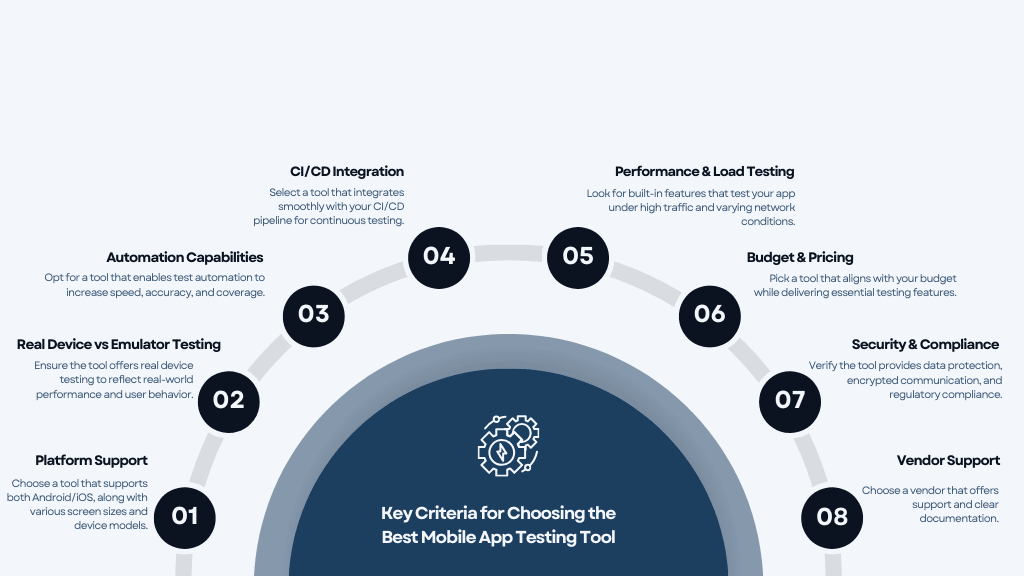
1. Platform support
For cross-platform app development, choose a tool that supports Android and iOS in a unified environment. This saves time and resources by avoiding separate testing.
Along with the platform, make sure that you select a tool that supports different screen sizes and device models to execute UI responsiveness test cases.
2. Real device testing vs. emulators/simulators
Emulators are fast and cost-effective but do not reflect actual usage conditions. Real-device testing provides more accurate results of user experience and functionality as it simulates real-world user environments.
Select a tool that offers real device testing to ensure precise and accurate results.
3. Automation capabilities
Choose a tool that supports automated testing to speed up testing cycles and reduce human error.
Tools with automation capabilities help with robust test scripts that automate repetitive tasks such as navigating the app, filling out forms, and verifying UI elements.
4. Integration with CI/CD tools
Select a tool compatible with continuous integration tools to ensure that test execution is automated and periodic.
If your company already has a continuous integration pipeline in place, look for compatible tools. This will ensure seamless integration of the tool development process.
5. Performance and load testing compatibilities
Performance testing is essential for applications that handle high traffic or intensive usage.
Ensure the tool includes features for load testing, stress testing, and monitoring app performance across various network conditions.
6. Budget and pricing
While selecting a tool for mobile application testing, choose one that fits your budget without compromising on the necessary features.
Compare the pricing models and subscriptions of different testing tools. For most tools, the price varies based on the number of users, devices, and concurrent tests.
7. Security
Assess the tool’s data protection and security to ensure your sensitive information remains secure.
Look for features like encrypted communications, secure storage, and compliance with industry standards such as GDPR or ISO certifications.
8. Vendor support
Select a tool with a reputation for responsive vendor support.
Having access to expert guidance, tutorials, and troubleshooting assistance helps with smooth onboarding and integration of tools in your test process.
Mobile Application Testing With Testlio
Testlio is the ultimate strategic partner you can combine with one of the above tools for your mobile application testing journey.
Unlike standalone tools, Testlio combines its extensive expertise, global network of testers, and integration capabilities to ensure comprehensive and high-quality testing.
With a 4.7/5 star rating on G2, Testlio accelerates and improves mobile application testing process by providing real-world testing services. Due to its global network of testers, Testlio is a robust choice for ensuring high-quality software delivery.
Following are a few ways that Testlio can help you with your testing process:
- Scalability: With Testlio, your test setup can scale up or down based on your requirements. Whether you are testing a small update or a large-scale release, Testlio will adapt to your needs.
- Tool selection: Our team evaluates your project requirements to select the most effective tools. After tool selection, the team assembles an expert QA team to achieve testing goals.
- Leverage the best tools: Testlio works with leading tools like Appium, TestRail, BrowserStack, Kobiton, and more. This ensures that a tailored solution is provided for your specific testing needs.
- Access to a global network of testers: Testlio’s network of over 10,000 professional testers worldwide ensures a thorough coverage across various devices and regions, managing an extensive in-house testing team.
- Flexibility in engagement models: Testlio offers fully customized testing options, so you can choose the model that best fits your company’s needs and budget.
- Faster time-to-market: Testlio teams integrate manual and automation testing to ensure early issue identification and faster time-to-market.
- Real device testing: Testlio emphasizes real device testing to provide accurate insights into how your app will perform in real-world environments. These testing options include functional, localization, usability, real device, distributed, and exploratory testing.

To streamline your test process, enhance user experience, and improve the overall quality of your mobile applications, contact our sales team.
